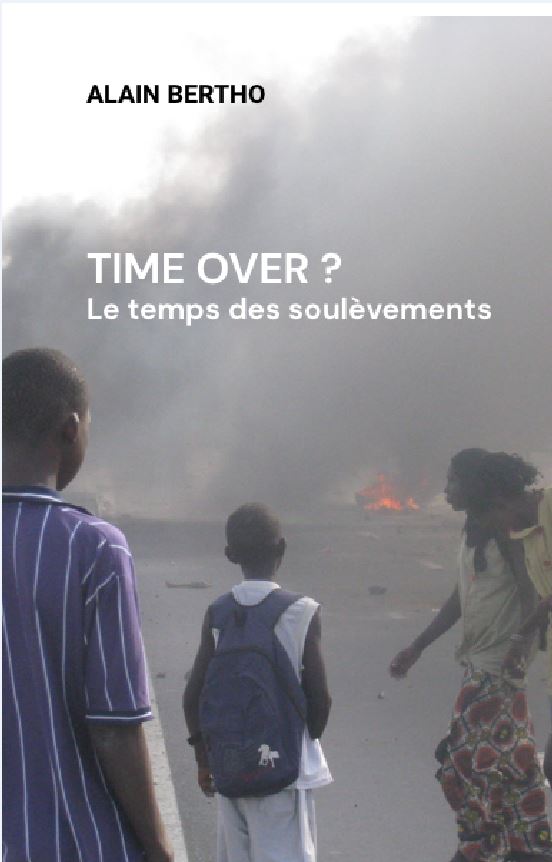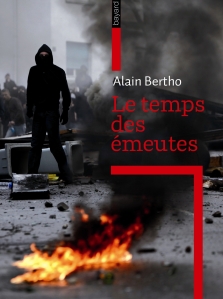Emeutes meurtrières en Grèce – 5 mai 2010
>> les vidéos <<
Trouble erupts as protesters try to storm Greek parliament
Bbc
Wednesday, 5 May 2010
Greek police officers fired tear gas at protesters trying to break through a police line in front of the parliament.
The trouble began as thousands gathered in Athens, part of a nationwide anti-austerity strike. The protests are a result of the spending cuts and tax rises the government will have to make to meet EU requirements as part of a 110bn euro rescue package.



Three Dead Amid Greek Protests, Rioting
RFE/RL
5 mai 2010
Greek authorities in the capital, Athens, say three people have died during rioting in the city today.
Police say the three were inside a bank building that was firebombed by protesters angry at the harsh austerity measures contained in the international financial-rescue package announced for Greece.
The riots came as tens of thousands of people joined protests across Greece.
Riot police and demonstrators fought running battles in the streets of Athens and also clashed outside parliament, where police fired tear gas and stun grenades to stop a section of the crowd breaking through the cordon in front of the building.
Several buildings were reported on fire in the center of the city.
The workers say they will have to bear the pain of the severe austerity measures contained in the financial rescue plan even though the country’s financial mess was caused by successive governments.
The 110 billion-euro ($141 billion) loan package — from Greece’s European partners and the International Monetary Fund (IMF) — foresees tens of billions of dollars of tax increases, pension cuts, and wage freezes to be imposed by the Greek government at the behest of the lenders.
Today’s strike was staged jointly by the public and private sectors. The country is paralyzed, with most public services and businesses closed down, and protester taking to the streets in Athens and other cities:
Greek Finance Minister George Papaconstantinou has admitted the austerity measures will hurt. He says the program is a very « difficult » one that will hit a lot of people not responsible for the situation.
But he says the choice is simple: either accept the rescue plan or have Greece « lined up against the wall. »
A Nervous Europe Looks On
Meanwhile, in Berlin, Chancellor Angela Merkel made a dramatic plea for her parliament to approve the rescue package, saying that the « future of Europe » is at stake, and in particular the fate of the single currency, the euro.
She said Europe’s haphazard way of dealing with problems — rarely facing up to them directly — is no longer good enough for the future.
The bailout is unpopular among the German public, who are reluctant to pay for Greece’s mistakes. Germany is the biggest contributor to the fund, paying almost one-third of Europe’s total share. A vote takes place on May 7.
Continuing doubts about the sufficiency of the package for Greece’s needs has led to nervousness on the global financial markets.
Speaking in Brussels today, EU Economic and Monetary Affairs Commissioner Olli Rehn sought to calm these nerves.
Rehn said the rescue package for Greece « has been calculated very carefully on the basis of the foreseen refinancing needs of Greece, and I’m confident that this figure of 80 billion from the euro-area member states and 30 billion from the IMF — all together 110 billion euros — will suffice for the refinancing needs of Greece over the next years. »
Markets worldwide suffered heavy losses on May 4, as fresh fears spread overnight from Europe and Wall Street to Asia today. The euro hit a one-year low against the dollar (below $1.29) today, but European markets strengthened slightly.
Investors fear that the massive Greek bailout will not be enough to stop the debt crisis from hitting Spain and Portugal, two other economically vulnerable members of the eurozone.



Three dead as Greek strike grows violent
CNN
May 5, 2010 –
Athens, Greece (CNN) — Police sirens and the smell of tear gas filled the streets around Greece’s parliament building Wednesday after protests against government spending cuts turned violent, then deadly.
Three people died and at least four others were missing after a fire bomb hit a bank in central Athens, the Greek fire brigade told CNN. The victims, two women and a man, were bank employees, they said.
Another 20 people were trapped on the floor above the MARFIN bank and were being rescued by firefighters, the fire brigade said.
The three dead were removed from the premises along with five survivors, the fire brigade said. They would not say whether the five survivors included any of those missing inside the bank.
Protesters were throwing bottles at police guarding the burned-out bank, shouting « torturers » and « liars » because they don’t believe people were killed inside. Riot police were moving in to push the crowd away, CNN’s Diana Magnay reported from the scene.
Bins and cars were set on fire around the city. Two public buildings were on fire and a fire truck was ablaze near the Temple of Zeus, the fire brigade said.
Riot police in helmets and shields ket back protesters who threw bottles, sticks, and rocks. Booms pierced the air every time the police fired canisters of tear gas at the crowds.
A mass of protesters made it onto the steps in front of the Greek parliament building early in the afternoon before riot police pushed them back.
Members of the parliamentary economic committee are inside the building reviewing a package of austerity measures to contain Greece’s spiraling debt. The measures are highly unpopular in Greece and the protesters on the steps demanded that the lawmakers come outside and face them.
The protests happened amid a general strike by thousands of public sector workers unhappy with the austerity measures, which largely target them. Private sector workers joined them on the picket lines Wednesday, along with thousands of transport workers — which brought transportation services to a halt.
Police estimated there were 15,000 workers were on the streets of Athens, but unions said there were many more. Among them were teachers, bank employees and doctors.
Throughout the capital, about 1,700 officers stood guard to maintain order.
The workers are protesting cuts in spending that the government says are needed to pull the country out of debt.
The Greek Parliament is expected to vote on the austerity measures — which include wage freezes and higher taxes — by the end of Thursday.
The Finance Ministry said the austerity bill goes before a parliamentary committee Wednesday and will be up for debate by the whole body the following day.
Tuesday, about 2,000 protesters representing teachers from the public sector marched past the Finance Ministry and Parliament.
In central Athens, protesters threw plastic bottles and sticks at riot police. At another demonstration, members of the Communist Party of Greece (KKE) erected large banners near the Parthenon. « People of Europe Rise Up, » said one.
The European Union announced a €110 billion ($145 billion) aid package for Greece on Sunday. Soon after, Greek Finance Minister George Papaconstantinou announced the tough cost-cutting measures to meet European Union and International Monetary Fund conditions for the deal.
The package includes a promise by Greece to cut its budget deficit to 3 percent of the country’s gross domestic product, as required by European Union rules, by 2014, according to Papaconstantinou.
The measures, he said, were needed for Greece to secure its financial lifeline.
Greece has a choice between « destruction » and survival, and « we have chosen, of course, to save the country, » Papaconstantinou said.

Grèce: violences lors des manifestations, au moins trois morts
AFP
ATHÈNES — Au moins trois personnes ont été tuées mercredi dans l’incendie d’une banque déclenché par des cocktails Molotov à Athènes où de violents affrontements ont éclaté lors d’une grande manifestation organisée à l’occasion d’une grève générale contre les mesures d’austérité.
Plusieurs dizaines de jeunes ont lancé des cocktails Molotov contre un immeuble abritant une agence de la banque Marfin dans le centre de la capitale grecque, mettant le feu au bâtiment alors qu’une vingtaine de personnes se trouvaient à l’intérieur. Au moins trois personnes, deux femmes et un homme, ont péri dans les flammes, a affirmé la police grecque à l’AFP, tandis que les pompiers ont pu évacuer à temps quatre autres personnes.
Les pompiers étaient à la recherche d’éventuelles autres victimes.
L’incendie a ensuite été maîtrisé mais de la fumée se dégageait toujours du deuxième étage, a constaté un journaliste de l’AFP.
Deux autres bâtiments administratifs du centre d’Athènes ont également été incendiés, a ensuite annoncé la police. On ignorait dans l’immédiat si des personnes se trouvaient à l’intérieur.
Par ailleurs, de violents affrontements ont éclaté non loin de là, devant le Parlement grec, entre jeunes et policiers en tenue anti-émeutes, après un face à face tendu.
Les manifestants ont lancé plusieurs cocktails Molotov contre des magasins, incendiant également une fourgonnette de la police et un véhicule des pompiers, selon les journalistes de l’AFP. Les policiers ont riposté par des gaz lacrymogènes, dont les vapeurs ont envahi tout le centre de la capitale.
Les manifestations contre les mesures d’austérité, qui avaient démarré dans le calme à l’appel des grands syndicats, ont réuni selon la police près de 30.000 personnes à Athènes et 20.000 à Salonique, la deuxième ville grecque dans le nord du pays.
Selon les journalistes de l’AFP sur place, plusieurs dizaines de milliers de personnes ont défilé dans la capitale.
La centrale syndicale du secteur privé (GSEE) a affirmé qu’il s’agissait du rassemblement « le plus important jamais organisé » en Grèce.
A Salonique, des jeunes manifestants ont jeté des pierres contre des magasins et des agences bancaires du centre de la ville, selon la police. Les forces de l’ordre ont riposté à coup de gaz lacrymogènes et les groupes de jeunes se sont ensuite dispersés.


Grèce: la grève générale contre la rigueur dégénère, trois morts
AFP
04/05/2010
De violents affrontements ont éclaté mercredi entre jeunes et policiers lors d’une grande manifestation contre la rigueur à Athènes, tuant au moins trois personnes piégées dans l’incendie d’une banque déclenché par un cocktail Molotov.
La police de la capitale grecque a été placée « en état d’alerte générale » face aux graves incidents qui ont débuté vers 14H00 (11H00 GMT). Selon des sources policières, les forces de l’ordre entendaient « arrêter les coupables » de l’incendie, alors qu’une certaine « accalmie » régnait en milieu d’après-midi.
Plusieurs dizaines de jeunes portant des cagoules ont lancé des cocktails Molotov contre des magasins, incendiant aussi une fourgonnette de police et un véhicule des pompiers, ont constaté des journalistes de l’AFP.
Un groupe a brisé la vitrine d’une agence de la banque Marfin et jeté une bouteille incendiaire, mettant le feu au bâtiment alors qu’une vingtaine de personnes se trouvaient à l’intérieur.
Au moins trois personnes, deux femmes et un homme, ont péri dans les flammes, a affirmé la police grecque à l’AFP.
Selon un porte-parole des pompiers, au moins cinq blessés ont été transférés dans un hôpital de la capitale.
L’incendie a ensuite été maîtrisé mais de la fumée se dégageait toujours du deuxième et dernier étage du bâtiment, a constaté un journaliste de l’AFP, tandis que les pompiers étaient à la recherche d’éventuelles autres victimes.
Deux autres bâtiments administratifs du centre d’Athènes, un bureau du fisc et une antenne de la préfecture, ont également été incendiés par des cocktails Molotov, a ensuite annoncé la police. Là aussi, les flammes ont été éteintes par les pompiers.
Par ailleurs, de violents affrontements ont éclaté non loin de là, devant le Parlement grec, où la commission des Affaires économiques examinait mercredi le plan d’austérité sans précédent adopté dimanche par le gouvernement en échange d’une aide financière de 110 milliards d’euros sur trois ans du Fonds monétaire international (FMI) et de la zone euro.
Après un face à face tendu, des heurts ont opposé jeunes et policiers en tenue anti-émeutes, selon les journalistes de l’AFP.
Les policiers ont riposté par des gaz lacrymogènes, dont les vapeurs ont envahi tout le centre de la capitale, les manifestants se sont ensuite dispersés.
En milieu d’après-midi, les forces de l’ordre étaient toujours fortement déployées, à la recherche des auteurs des troubles, selon une source policière.
« Ce n’est que le début d’une grande guerre », a affirmé, lors de la manifestation, Hélène Galani, une journaliste venue participer à la grève générale, la troisième en moins de trois mois.
« On a vu ce qui s’est passé dans les pays où le FMI est intervenu », renchérit Jim Zach, comptable dans la fonction publique, « ils ont viré plein de monde, fermé les hôpitaux ».
« FMI et UE nous volent un siècle d’acquis sociaux », pouvait-on lire sur une banderole.
Les manifestations contre les mesures d’austérité, qui avaient démarré dans le calme à l’appel des grands syndicats des secteurs privé et public, ont réuni selon la police près de 30.000 personnes à Athènes et 20.000 à Salonique, la deuxième ville grecque dans le nord du pays.
Selon les journalistes de l’AFP sur place, plusieurs dizaines de milliers de personnes ont défilé dans la capitale.
La centrale syndicale du secteur privé (GSEE) a affirmé qu’il s’agissait du rassemblement « le plus important jamais organisé » en Grèce.
A Salonique, des jeunes manifestants ont jeté des pierres contre des magasins et des agences bancaires du centre de la ville, selon la police. Les forces de l’ordre ont riposté à coup de gaz lacrymogènes et les groupes de jeunes se sont ensuite dispersés.
Les médias grecs, théoriquement en grève, ont suspendu leur mouvement pour diffuser des images des violences.











http://www.occupiedlondon.org/blog/2010/05/05/an-employee-of-marfin-bank-speaks-on-tonights-tragic-deaths-in-athens/